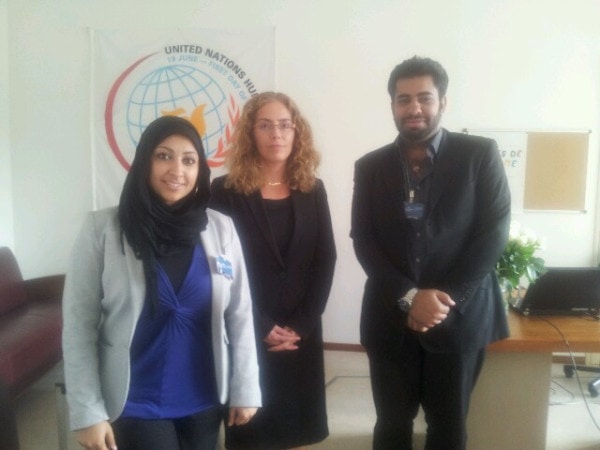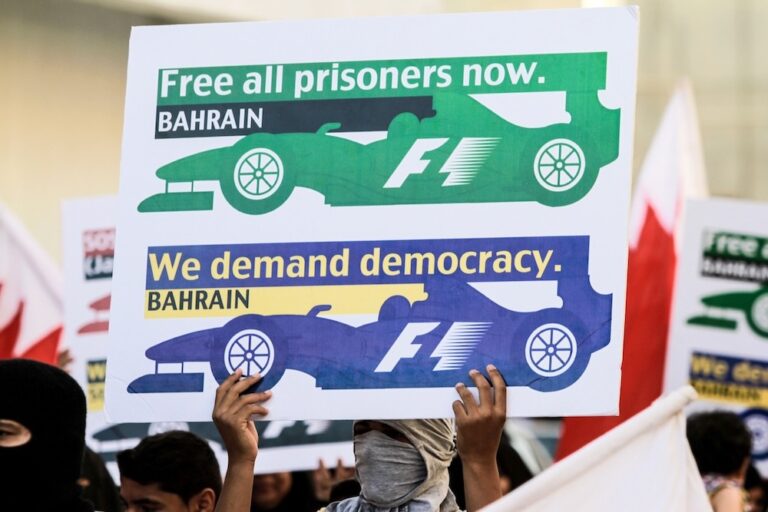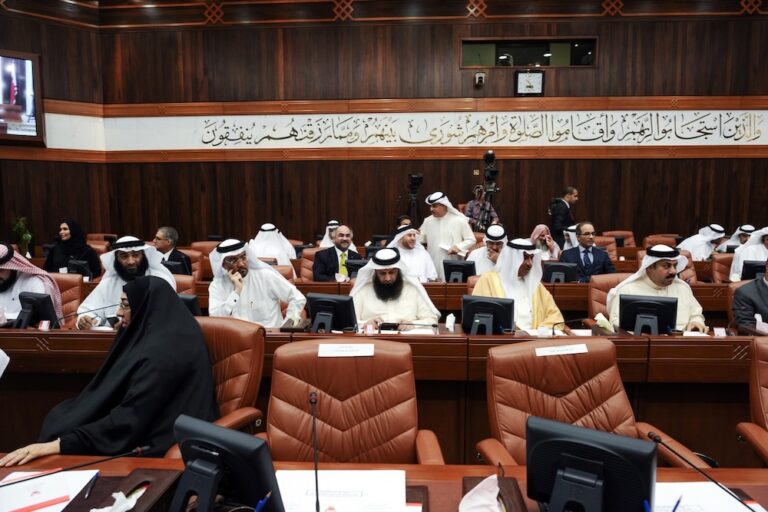Bahraini human rights defenders reported threats against them as a result of their participation in a UN review process; while IFEX members call on authorities to follow through on free expression recommendations.
Even as Bahrain accepted many of the recommendations to end human rights violations made during a UN review this week at the Human Rights Council in Geneva, Bahraini human rights defenders reported threats against them as a result of their participation in the process.
On 19 September, Bahrain accepted 145 of the 176 recommendations made as part of the Universal Periodic Review (UPR) of Bahrain, a process whereby states and NGOs contribute towards improving the human rights record of a country. The process occurs every four years.
According to a statement by Human Rights Watch, the recommendations accepted include “more than a dozen calling on the government to hold security forces accountable for rights abuses, including wrongful deaths and mistreatment of detainees in government custody.” Other recommendations include immediately releasing prisoners who have been convicted solely for exercising their rights to peaceful assembly and free expression during pro-democracy demonstrations in February and March 2011.
A week before, Salah Ali, Bahrain’s minister of state for human rights, said the government fully accepted 143 of the 176 recommendations in response to the report of the UN working group on Bahrain’s UPR that was issued in July 2012.
The UPR “needs to be quickly followed by releasing leaders of peaceful protests, holding accountable high officials responsible for policies of torture, and adopting broader reforms to uphold human rights,” said Joe Stork, deputy Middle East director at Human Rights Watch. “The government has been claiming for months that it accepts the recommendations of the Bahrain Independent Commission of Inquiry (BICI) but continues to stall on the core issues and to deny that political detainees are still in Bahraini jails.”
Many UN member states have been using the BICI, Bahrain’s own internal review of the human rights violations that occurred following peaceful pro-democracy protests that began in early 2011, as a benchmark for accountability. Following the oral intervention by the United States, Assistant Secretary Michael Posner said, “progress is slowing down, and that’s a concern.” He noted, “everyone who is peacefully dissenting and expressing their views has the right to do that and shouldn’t be prosecuted.”
The United Kingdom parliament’s Foreign Affairs Select Committee is to launch an inquiry into human rights abuses in Bahrain and Saudi Arabia, following a briefing organised by Index on Censorship with Maryam Al-Khawaja, Acting President of the Bahrain Centre for Human Rights (BCHR).
In his final remarks at Bahrain’s UPR adoption, H.E. Mr. Shaikh Khalid Bin Ahmed Bin Mohamed Al Khalifa, Minister of Foreign Affairs, denied that anyone was kept in jail for exercising their free expression. He claimed all charges related to free expression had been dropped, and admitted “there may be some controversies” over certain cases.
Yet in her oral intervention at the UN, BCHR’s Maryam Al-Khawaja noted, “The situation of targeting human rights defenders and the use of reprisals has dramatically escalated. Human rights defenders are constantly arrested, mistreated and the government continues to use the judiciary system as a tool to lock them up. Most, if not all of their charges are based on freedom of expression.” Watch the video online here.
Among those detained are her father Abdulhadi Al-Khawaja, a founder of BCHR, who was sentenced to life in prison for his role in peaceful protests last year, and BCHR’s President Nabeel Rajab, sentenced in August to three years in prison for calling for “illegal gatherings.” During its intervention at the UN, Reporters Without Borders (RSF) also noted that blogger Abduljalil Al-Singace had been sentenced to life and blogger Ali Abdulemam had been sentenced to 15 years in absentia – in violation of their right to free expression.
Maryam Al-Khawaja noted that as of today there are approximately 1400 political prisoners in Bahrain, 50 of whom are under 18.
As well, she reports, “The security forces are still using excessive force to repress all daily protests. Security forces continue the unprecedented use of tear gas during protests and inside residential areas. Also, arbitrary arrests using excessive force on the streets and during home raids by beating and insulting detainees are still ongoing and are not excluding minors. Many detainees are held in very bad conditions in the prisons and systematic torture is still ongoing in official and unofficial torture centers.”
Dr. Nada Dhaif, of the Bahrain Rehabilitation & Anti Violence Organization (BRAVO), made an oral intervention highlighting the impact on families of having their loved ones detained, and mentioning that protesters are hurt by police, such as Zainab Al-Khawaja, currently detained with a broken leg. She also mentioned the reprisals against human rights defenders who travel to Geneva and forcefully called on the Foreign Minister to immediately release all political prisoners. “Activists are not criminals,” she said.
Among Bahraini human rights defenders lobbying in Geneva at the UN Human Rights Council (UNHRC) who have been threatened or harassed was Mohammed Al-Maskati, president of the Bahrain Youth Society for Human Rights, who received death threats over the past week. Pro-government newspaper Al-Watan published photos of the civil society activists who were in Geneva, and the threats continue.
However, the UN is taking the question of reprisals seriously, including at a panel session on the topic on 13 September. Maryam Al-Khawaja and Al-Maskati met with the UN HRC President Laura Dupuy Lasserre this week to discuss concerns about reprisals against Bahraini civil society. The President herself came under attack after she spoke out in the council against threats to Bahrain human rights defenders during Bahrain’s UPR in May.
According to the Cairo Institute for Human Rights Studies (CIHRS), during a 17 September event about human rights defenders in the Gulf region, “Several individuals who possessed badges from the Bahrain government mission began to harass and attempted to intimidate the speakers on the panel before the event began. The organizers of the event then asked these representatives of the Bahrain Mission to kindly remove their video camera from the room.” Likewise, some of the same people turned up at an event organised by Civicus, CIHRS and other groups on 18 September, Bearing Witness: Bahrain and the UPR Process, to try to intimidate the participants.
CIHRS, the Gulf Centre for Human Rights (GCHR) and the International Service for Human Rights (ISHR) jointly called “on the government of Bahrain to abide by its commitments to provide security and protection for human rights defenders who co-operate with the UN.”



